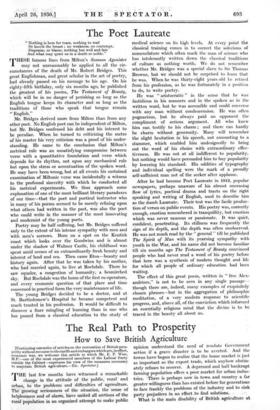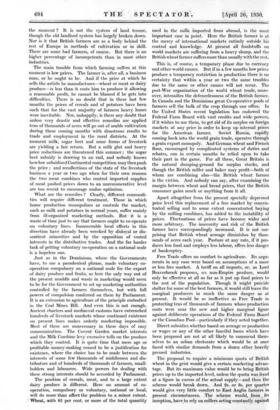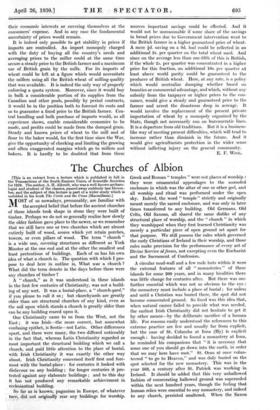The Real Path to Prosperity How to Save British Agriculture
[Continuing our series of articles on the restoration of Britishpros- perity without recourse to the tariffs and embargoes which are, in effect, economic war, we welcome this article in which Mr. E. F. Wise, M.P.—one of the most experienced members of the LabOUr Party outside the Cabinet—expresses his view of the measures necessary to maintain British agriculture.—En. Spectator.]
THE last feW Months have 'witnessed -a remarkable Change in the attitude of 'the Public, rural" and Urban, id the problems and difficulties of 'agriculture. The growing seriousness -of the situation, the sense of helplessness and of alarm, 'have united all sections of the rural population in an organized attempt to make public opinion understand the need of resolute Government action if a grave disaster is to be averted. And the towns have begun to realize that the home market is just as important as the export trade, which anyhow obstin- ately refuses to recover. A depressed and half bankrupt farming population offers a poor market for urban indus- tries; ' There is perhaps now in town and country a far greater willingness than has-existed before for generations to -face frankly the problems of the industry and to sink party prejudices in an effort .to find solutions.. What is the main disability of British agriculture at the moment ? It is not the system of land tenure, though the old landlord system has lately broken dovin. Nor is it that British fanners are as a body behind the rest of Europe in methOds of cultivatiOn or hi. skill. There are some bad farmers, of course. But there is no higher percentage of incompetents than in most other industries.
The main trouble from which farming suffers at this moment is kiw prices. The fanner is, after all, a business man, or he ought to be. And if the price at which he sells the article he manufactures—wheat or meat or dairy produce—is less than it costs him to produce it allowing a reasonable profit, he cannot be blamed if he gets into difficulties. There is no doubt that in these last few months the prices of cereals and of potatoes have been such that for the vast majority of farmers heavy losses were inevitable. Nor, unhappily, is there any doubt that unless very drastic and effective remedies are applied tens of thousands of acres will go out of arable cultivation during these coming month's with disastrous results to trade and employment in the rural districts. At the moment milk, sugar beet and some forms of livestock are yielding a fair return. But a milk glut and heavy price reductions are threatened this summer ; the sugar beet subsidy is drawing to an end, and nobody knows how low subsidized Continental competition may then push the price ; and recollections of the state of the livestock business a year or two ago when for their own reasons the two meat combines who control imported supplies of meat pushed prices down to an unremunerative level are too recent to encourage undue optimism.
What are the remedies ? Clearly, different commodi- ties will require different treatment. Those in which -home production monopolizes or controls the market, such as milk and potatoes in normal years, suffer mainly from ill-organized marketing methods. But , it is a waste of time just to say that farmers ought to co-operate on voluntary lines: Innumerable local efforts in this direction have already been wrecked by disloyal or dis- sentient minorities and by the opposition of vested interests in the distributive trades. And the far harder task of getting voluntary co-operation on a national scale is a hopeless one.
Just as in the Dominions, where the Governments have, to use a paradoxical phrase, made voluntary co- operation compulsory on a national scale for the export of dairy produce and fruits, so here the only way out of the present muddle and waste in marketing would seem to be for the Government to set up marketing authorities controlled by the farmers themselves, but with full powers of compulsion conferred on them by Parliament. It is an extension to agriculture of the principle embodied in the Coal Mines Bill. And even this is not enough. Ancient charters and mediaeval customs have entrenched hundreds of livestock -markets whose continued existence on present lines makes orderly marketing impossible. Most of these are unnecessary in these days of easy communication. The Covent Garden market interests and the Milk Combine levy excessive tolls on the produce which they control. It is quite time that mere age or profitable money-making ceased to be a justification for existence, where the choice has to be made between the interests of some few thousands of middlemen and dis- tributors and of hundreds of thousands of farmers, small- holders and labourers. Wide powers for dealing with these strong interests should be accorded by Parliament.
The position of cereals, meat, and to a large extent dairy produce is different. Here no amount of co- operation, compulsory or voluntary, national or local, will do more than affect the problem to a minor extent. Wheat, with 85 per cent. or more of the total quantity used in the mills imported from abroad, is the most important case in point. • Here the British farmer is at the mercy of international markets entirely outside hiS control and knoivledge. At present all foodstuffs- on world markets are suffering frOm a heavy slump, and the British wheat farmer suffers more than usually with the rest.
This is, of course, a temporary phase due to currency and other world causes. But if in a few months low prices produce a temporary restriction in production there is no certainty that within a year or two the same troubles due to the same or other causes will not recur. The post-War organization of the world wheat trade, more- over, intensifies the defencelessness of the. British farmer. In Canada and the Dominions great Co-operative pools of farmers sell the bulk of the crop through one office. In the United States recent legislation has endowed the Federal Farm Board with vast credits and wide powers, if it wishes to use them, to get rid of its surplus on foreign markets at any price in order to keep up internal prices for the American farmer. Soviet Russia, rapidly coming back into the world grain trade, operates through a grain export monopoly. And German wheat and French flour, encouraged by complicated systems of duties and rebates, can in certain months be relied upon to take their part in the game. For all these, Great Britain is the natural dumping-ground for surplus stocks, and though the British miller and baker may profit—both of whom are combining also—the British wheat farmer is the victim. And nobody can say, after examining the margin between wheat and bread prices, that the British consumer gains much or anything from it all.
Apart altogether from the present specially depressed price level this replacement of a free market by concen- trated selling and to some extent concentrated buying by the milling combines, has added to the instability of prices. Fluctuations of prices have become wider and more arbitrary. The insecurity and risk of the British farmer have correspondingly increased. It is not sur- prising that British wheat acreage diminishes by thou- sands of acres each year. Pasture at any rate, if it pro- duces less food and employs less labour, offers less danger of bankruptcy.
Free Trade offers no comfort to agriculture. Its argu- ments in any case were based on assumptions of a more or less free market. A tariff on all imports, or, as Lord Beaverbrook proposes, on non-Empire produce, would only be effective at all so far as it put up food prices to the rest of the population. Though it might pnivide shelter for some of the best farmers, it would still leave the marginal producers in much the same danger as at present. It would be as ineffective as Free Trade in protecting tens of thousands of farmers whose production costs were near the new and higher marginal figure against deliberate operations of the Federal Farm Board or the Canadian Pool—particularly if they acted together.
Direct subsidies whether based on acreage or production or wages or any of the other fanciful bases which have been proposed are not at all likely to commend them- selves to an urban electorate which would be at once . faced with similar demands from a dozen other heavily pressed industries.
The proposal to require a minimum quota of British wheat in the grist would give a certain marketing advan- tage. But its maximum value would be to bring British prices up to the imported level, unless the quota was fixed at a figure in excess of the actual supply—and then the scheme would break down. And 2s. or 3s. per quarter would give very little comfort to East Anglia farmers in present circumstances. The scheme would, from its inception, have to rely on millers acting constantly against their economic interests or covering themselves at the consumers' expense. And in any case the fundamental uncertainty of prices would remain.
It is indeed only possible to get stability in prices if imports are controlled. An import monopoly charged with the duty of buying all the country's needs and averaging prices to the miller could at the same time secure a steady price to the British farmer and a maximum use of British grain by the mills. For its imports of wheat could be left at a figure which would necessitate the millers using all the British wheat of milling quality that was available. It is indeed the only way of properly enforcing a quota system. Moreover, since it would buy in bulk a considerable portion of its supplies from the Canadian and other pools, possibly by period contracts; it would be in the position both to forecast its costs and so to guarantee a fixed price to the British farmer. Cen- tral handling and bulk purchase of imports would, as all experience shows, enable considerable economies to be made, and profits could be made from the dumped grain. Steady and known prices of wheat to the mill and of flour to the baker would, for the first time since the War, give the opportunity of checking and limiting the growing and often exaggerated, margins which go to millers and bakers. It is hardly to be doubted that from these sources important savings could be effected. And it would not be unreasonable if some share of the savings in bread prices due to Government intervention went to the British farmer in a higher guaranteed price of wheat. A mere id. saving on a 9d. loaf could be reflected in an additional 2s. per quarter on the total wheat used. And since on the average less than one-fifth of this is British, if the whole 2s. per quarter was concentrated in a higher price for this fraction, an additional 10s. per quarter at least above world parity could be guaranteed to the producer of British wheat. Here, at any rate, is a policy which would neutralize dumping whether based on bounties or commercial advantage, and which, without any subsidy from the taxpayer or higher prices to the con- sumer, would give a steady and guaranteed price to the farmer and arrest the disastrous drop in acreage. It would involve the replacement of the present private importation of wheat by a monopoly organized by the State, though not necessarily run on bureaucratic lines. It is a departure from old traditions. But it is a business- like way of meeting present difficulties, which will tend to increase rather than diminish in the future. And it would give agriculturists protection in the wider sense without inflicting injury on the general community.
E. F. WISE.






































 Previous page
Previous page